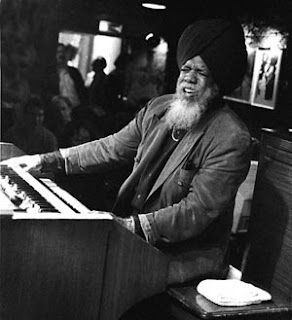Da Star in dastar - Dr. Lonnie Smith
Da Star in dastar
Excerpt from:
My favorite example of an unexpected turban is the one on the head of jazz keyboardist Dr. Lonnie Smith, who bears more than a passing resemblance to my father (even my dad has remarked upon this).
Who is Lonnie Smith?
Dr. Lonnie Smith is internationally known as one of the premier jazz keyboardists in the history of the idiom. A dominant talent and pace-setting proponent of the Hammond B3 Organ and widely recognized and gifted pianist, Lonnie has been at the forefront of the jazz scene since 1969 when he was named Top Organist by Downbeat Magazine. Most recently, Dr. Smith has been awarded the Organ Keyboardist of the Year award in 2003, 2004 and 2005 by the Jazz Journalist Association.
Interestingly, when asked about the turban, he makes reference to Sikhism. He also keeps his hair long and in a top-knot, like Sikh men do. You can see it in the photo quite clearly. It is unclear to me whether he is a convert to Sikhism, however. There’s only one interview I can find where Sikhism is mentioned, and the writer doesn’t pass along any information of use. He certaintly looks like a Sikh, and that’s a very Sikh style of turban, but nobody (not even a friend who is in 3HO) seems to know.
Who is Lonnie Smith?

Dr. Lonnie Smith is internationally known as one of the premier jazz keyboardists in the history of the idiom. A dominant talent and pace-setting proponent of the Hammond B3 Organ and widely recognized and gifted pianist, Lonnie has been at the forefront of the jazz scene since 1969 when he was named Top Organist by Downbeat Magazine. Most recently, Dr. Smith has been awarded the Organ Keyboardist of the Year award in 2003, 2004 and 2005 by the Jazz Journalist Association.
Interestingly, when asked about the turban, he makes reference to Sikhism. He also keeps his hair long and in a top-knot, like Sikh men do. You can see it in the photo quite clearly. It is unclear to me whether he is a convert to Sikhism, however. There’s only one interview I can find where Sikhism is mentioned, and the writer doesn’t pass along any information of use. He certaintly looks like a Sikh, and that’s a very Sikh style of turban, but nobody (not even a friend who is in 3HO) seems to know.
His affinity for R&B melded with his own personal style, and he quickly became a local legend. He moved to New York City, where he met George Benson, the guitarist for Jack McDuff's band. Benson and Smith connected on a personal level, and the two formed the George Benson Quartet featuring Lonnie Smith in 1966. After two albums (It's Uptown and Cookbook), Smith recorded his first solo album (Finger Lickin' Good) in 1967, with George Benson on guitar, Ronnie Cuber on bass, Melvin Sparks and Marion Booker on drums. This combination remained stable for the next five years. In 1967, Smith met Lou Donaldson, who put him in contact with Blue Note Records. Donaldson asked the quartet to record an album for Blue Note, Alligator Boogaloo. Blue Note was so impressed by the album that they signed Smith for the next four albums, all of which are now considered classics of soul jazz. This highly influential period produced Think (with Melvin Sparks, Marion Booker, Lee Morgan and David Newman) and Turning Point (with Lee Morgan, Benny Maupin, Melvin Sparks and Idris Muhammed). The latter is largely regarded as his most seminal studio album.

There’s actually quite a tradition of (mainly black) musicians in the 1950s and 1960s wearing turbans. The bottom photo on the left is of a group that even called itself the Turbans:
The Turbans were a Philadelphia based R&B vocal group that had chart success in the mid-50…. the Turbans are credited with performing the first hit record to include the phrase ‘doo-wop’.

Visit the following link:

Comments